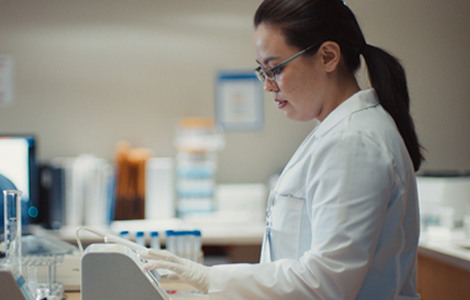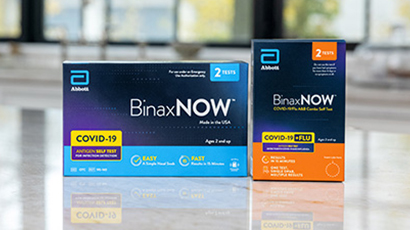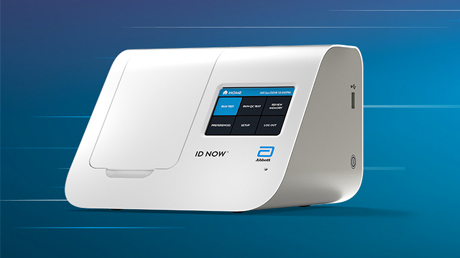Global Point of Care



RAPID TESTING FOR RESPIRATORY ILLNESSES
Rapid tests are essential tools to help diagnose what’s behind your symptoms, so you can treat earlier and get well sooner.
TEST NOW. TREAT EARLIER. GET WELL SOONER.
Do you have a sore throat? Congestion? A stuffy or runny nose? A cough? It could be a cold, but it could be something else. Any of these symptoms could point to different respiratory infections that require different treatments. The best way to know how to treat what’s making you or a loved one feel unwell is to test.
If you or a loved one have respiratory symptoms—or been exposed to someone else’s—rapid, reliable testing can pinpoint what’s behind those symptoms in minutes.
Here’s the good news. You have a choice.
Stay home and test yourself with an over-the counter (OTC) rapid antigen self-test. You can even stock up to keep tests on hand to use when you have COVID-19 or flu symptoms or been exposed to others that do.
Or you can visit a test provider to perform a test right away in a convenient care location. These locations may use advanced technology that provides their clinicians fast and accurate results so you can get treated during the same visit and get well sooner.
Sign up for Rapid Insights, our email series on rapid testing.
This program will teach you about rapid tests and how they can quickly identify illnesses like the flu, COVID-19, respiratory syncytial virus (RSV), and strep throat. Rapid molecular testing can help you get treated earlier and get well sooner.


make the choice
that is best for you
Depending on your symptoms, you may choose to conduct a self test or visit a test provider for a fast and accurate rapid molecular test to be conducted during your visit. Having accurate test results can help your clinician to prescribe the appropriate treatment.

OVER-THE-COUNTER
RAPID ANTIGEN SELF TEST
Testing yourself or a family member
- This widely-used test technology quickly identifies a protein of the virus (called an antigen) which causes infection and provides test results in minutes.
- Sold at your local pharmacy or online – available for COVID-19 or COVID-19 and Flu combined.
- Easy to follow instructions with results in 15 minutes or less.
- Good predictor of an active infection (negative result may require repeating the test).

Rapid Molecular Tests From
A test provider
Molecular results, in minutes
- Rapid molecular testing uses advanced technology to quickly identify the existence of specific genetic material—DNA or RNA—of the virus or bacteria and gives results in minutes.
- Performed by a trained test provider at a convenient care location.
- Providers can test for multiple respiratory infections including COVID-19, Flu, Strep or RSV with accurate test results in 13 minutes or less. Highly accurate, whether positive or negative.
- Many test providers can offer treatment during the same visit.
Experiencing symptoms?
Want to know more? We have a video that explains different respiratory infections and rapid testing options that can provide answers, so you get the appropriate treatment.
EVERY TEST HAS A ROLE
Testing has now become part of our daily conversation due to the COVID-19 pandemic. There are many different types of respiratory diagnostic tests that can be used to test for the flu, COVID-19, RSV, and strep throat.
TYPES OF TESTS AND TERMS TO KNOW
Rapid molecular tests (ISOTHERMAL/PCR TECHNOLOGY)
Rapid molecular tests detect viral RNA or DNA with results available in minutes.
- Performed via a nasal or throat swab
- Used at the point of care by a trained professional including doctors’ offices, urgent care, emergency departments, and pharmacies
- Provide results in less than 13 minutess
Molecular PCR test
Molecular PCR tests detect viral RNA or DNA.
- Performed via a nasal, nasopharyngeal or throat swab
- Samples sent to a lab or hospital to run on a larger instrument together with higher volumes of patient samples.
- Results are typically available in 1-3 days
Rapid Antigen Self Test
Detects active infection by identifying a protein from the virus or bacteria that causes that infection.
- Performed via nasal or throat swab
- Can be used at doctors' offices, urgent care, emergency rooms, pharmacy clinics.
- Self Tests for COVID-19 and COVID-19/Flu can be purchased in-store or online.
- Results available in less than 15 minutes.
Viral RNA
When a virus first enters your body, it starts multiplying, and you may or may not have symptoms.
Antigen
As the virus multiplies, the body begins to react to the viral antigens, possibly resulting in symptoms.
Antibody
As your body starts to fight off infection, your immune system produces IgM and IgG antibodies.


EVERY TEST HAS A ROLE
Testing has now become part of our daily conversation due to the COVID-19 pandemic. There are many different types of respiratory diagnostic tests that can be used to test for the flu, COVID-19, RSV, and strep throat.
TYPES OF TESTS AND TERMS TO KNOW
RAPID MOLECULAR TESTS (ISOTHERMAL/PCR TECHNOLOGY)
Rapid molecular tests detect viral RNA or DNA with results available in minutes.
- Performed via a nasal or throat swab
- Used at the point of care by a trained professional including doctors’ offices, urgent care, emergency departments, and pharmacies
- Provide results in less than 13 minutes
Molecular PCR test
Molecular PCR tests detect viral RNA or DNA and are conducted in a lab.
- Performed via a nasal, nasopharyngeal or throat swab
- Samples sent to a lab to run on a larger instrument together with higher volumes of patient samples.
- Results are typically available in 1-3 days
Rapid Antigen Test
Detects active infection by identifying a protein from the virus or bacteria that causes that infection.
- Performed via nasal or throat swab
- Can be used at doctors' offices, urgent care, emergency rooms, pharmacy clinics.
- Self Tests for COVID-19 and COVID-19/Flu can be purchased in-store or online.
- Results available in less than 15 minutes.
Viral RNA
When a virus first enters your body, it starts multiplying, and you may or may not have symptoms.
Antigen
As the virus multiplies, the body begins to react to the viral antigens, possibly resulting in symptoms.
Antibody
As your body starts to fight off infection, your immune system produces IgM and IgG antibodies.


read more about rapid
molecular testing

BINAXNOW™. KNOW NOW.
During the early stages of the pandemic, we helped pioneer the technology used on the frontlines to test for COVID-19. Now that same technology is available to you in a convenient at-home self test. You can choose between testing for COVID-19 only or COVID-19 and Flu combined.

ALL ABOUT RESPIRATORY ILLNESS
Learn about respiratory illnesses and the different types of advanced molecular testing technologies that offer fast and accurate results. Knowing now means you’ll be treated earlier which can help you get well sooner.

Discover ID NOW™ rapid molecular testing
ID NOWTM rapid molecular tests provide your healthcare professional with timely results, that can inform your treatment, which may include antivirals or antibiotics, so you can get well sooner.
References
- Azar, Marwan M., Marie L. Landry. “Detection of Influenza A and B Viruses and Respiratory Syncytial Virus by Use of Clinical Laboratory Improvement Amendments of 1988 (CLIA)-Waived Point-of-Care Assays: A Paradigm Shift to Molecular Tests.” Journal of Clinical Microbiology 56, no. 7 (July 2018): e00367-18. https://doi.org/10.1128/JCM.00367-18.
- Merckx, Joanna, et al. “Diagnostic Accuracy of Novel and Traditional Rapid Tests for Influenza Infection Compared With Reverse Transcriptase Polymerase Chain Reaction: A Systematic Review and Meta-Analysis.” Annals of Internal Medicine 167, no. 6 (September 19, 2017): 394-409. https://doi.org/10.7326/M17-0848.
- Franck, Kristina T., et al. “Evaluation of Immuview RSV Antigen Test (SSI Siagnostica) and BinaxNOW RSV Card (Alere) for Rapid Detection of Respiratory Syncytial Virus in Retrospectively and Prospectively Collected Respiratory Samples.” Journal of Medical Virology 92, no. 12 (December 2020): 2992-2998. https://doi.org/10.1002/jmv.26369.
- Cohen, Jérémie F., et al. “Rapid Antigen Detection Test for Group A Streptococcus in Children With Pharyngitis (Review).” Cochrane Database of Systematic Reviews, no. 7, article no. CD010502, (2016). https://doi.org/10.1002/14651858.CD010502.pub2.
- “ID Now Influenza A & B 2 Quick Reference Instructions.” Abbott, 2020.
- “ID Now RSV Quick Reference Instructions.” Abbott, 2020.
- “ID Now Strep A 2 Quick Reference Instructions.” Abbott, 2020.
- Hagen, Ashley. “COVID-19 Testing FAQs.” American Society for Microbiology. August 19, 2021. https://asm.org/Articles/2020/April/COVID-19-Testing-FAQs.
- “Alere i Strep A 2 Package Insert.” Alere, 2018.
- Shuren, Jeffrey E. “Coronavirus (COVID-19) Update: FDA Takes Steps to Streamline Path for COVID-19 Screening Tools, Provides Information to Help Groups Establishing Testing Programs.” Food and Drug Administration. March 16, 2021. https://www.fda.gov/news-events/press-announcements/coronavirus-covid-19-update-fda-takes-steps-streamline-path-covid-19-screening-tools-provides.
- Pfeil, Johannes, et al. “Screening for Respiratory Syncytial Virus and Isolation Strategies in Children Hospitalized with Acute Respiratory Tract Infection.” Medicine 93, no. 25 (November 2014):e144. https://doi.org/10.1097/MD.0000000000000144.



